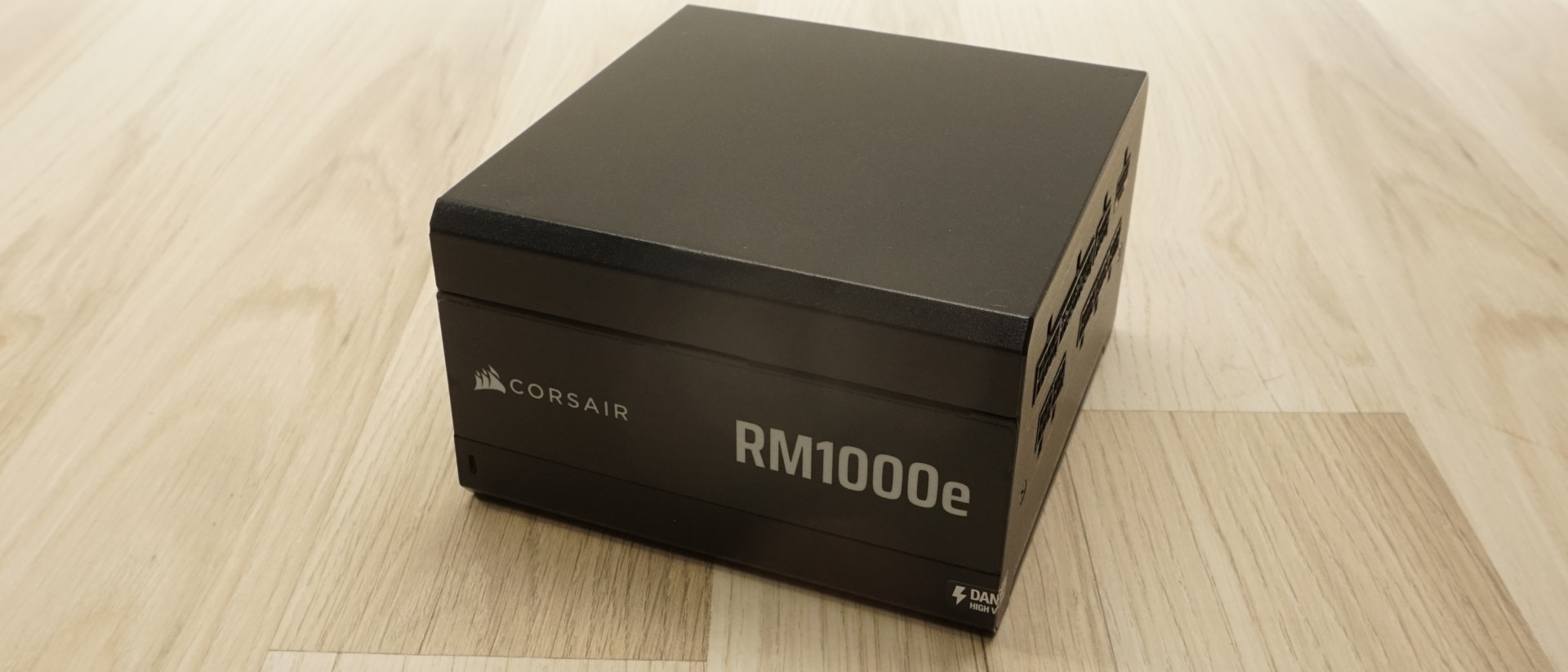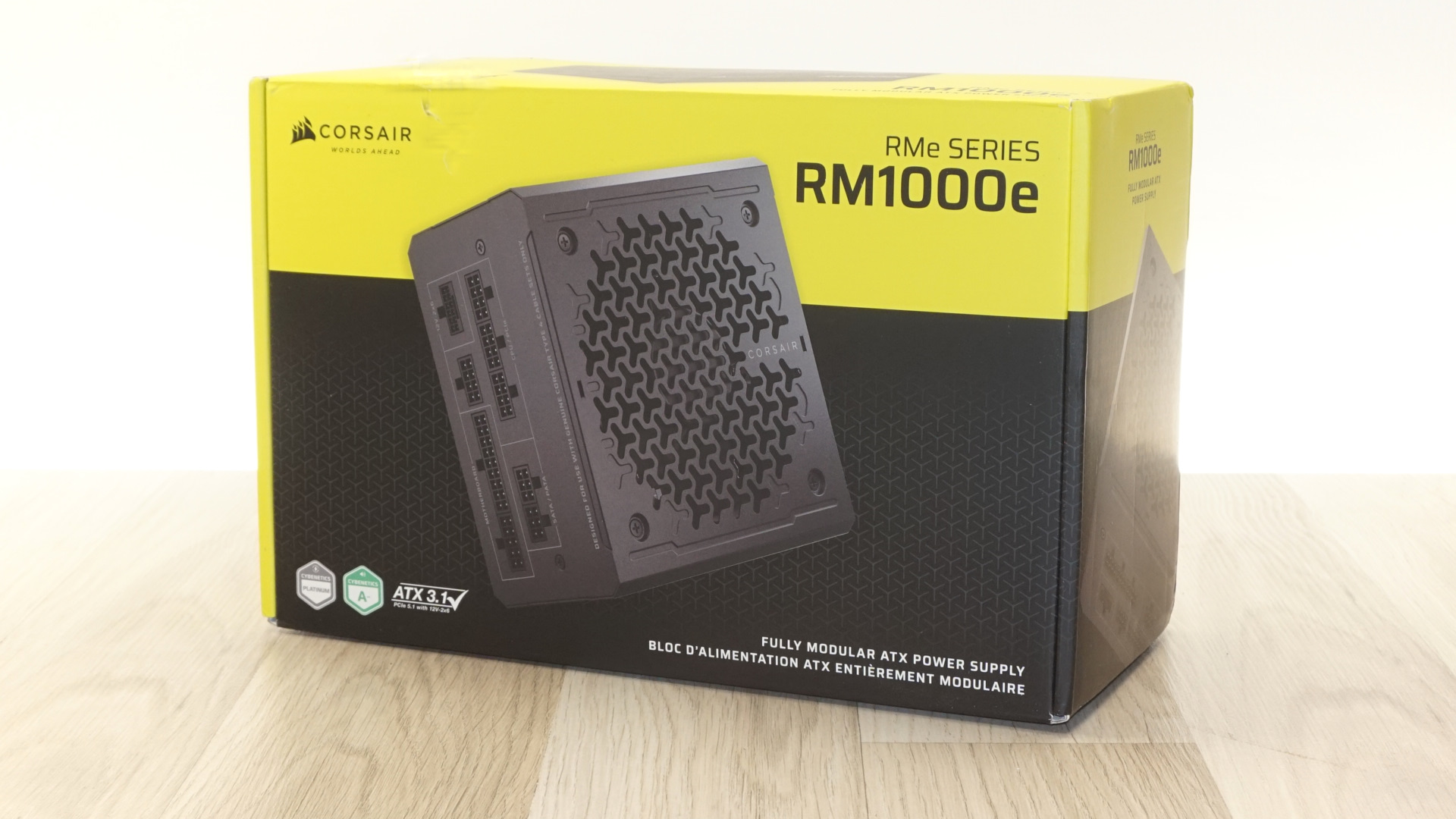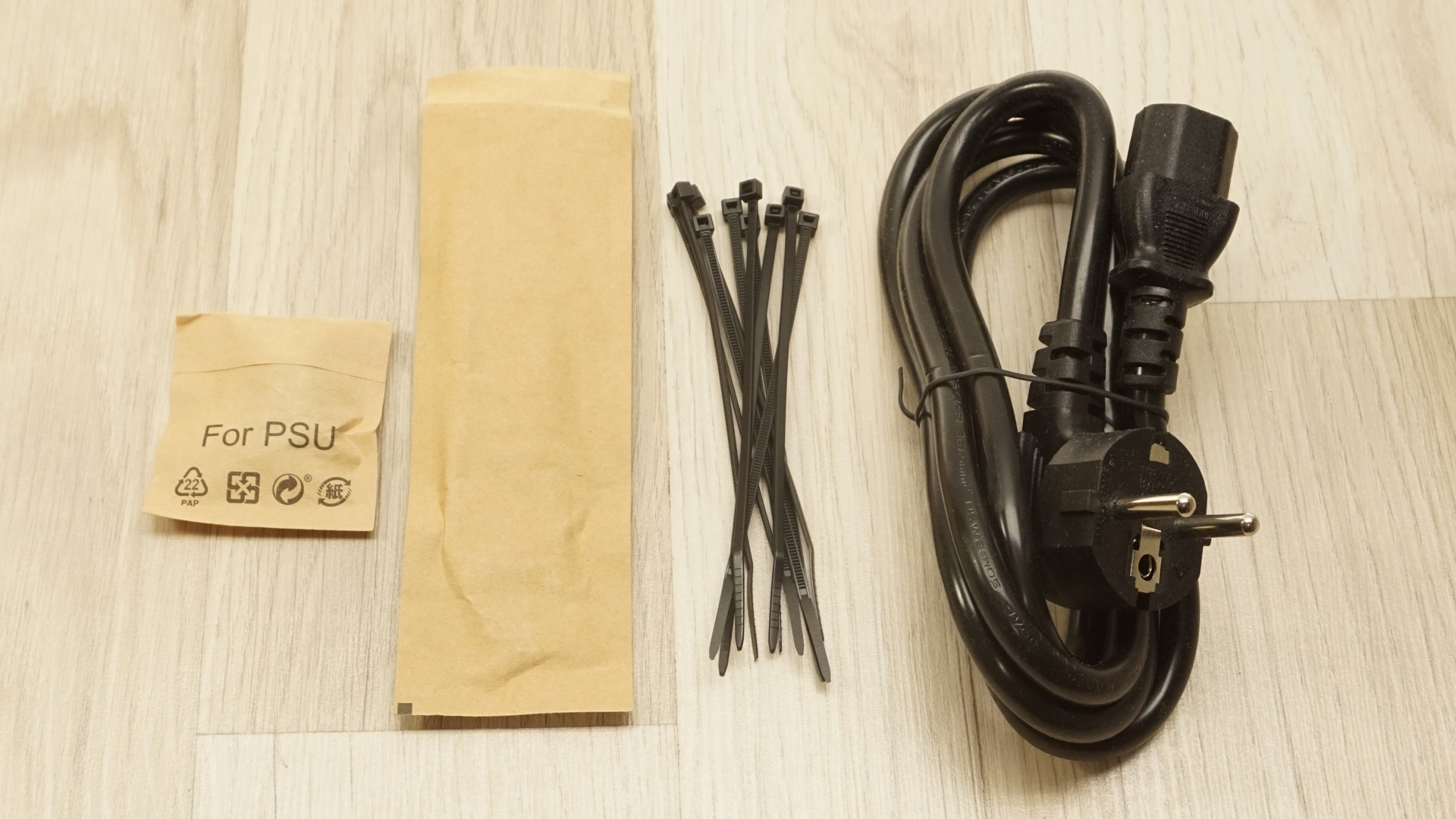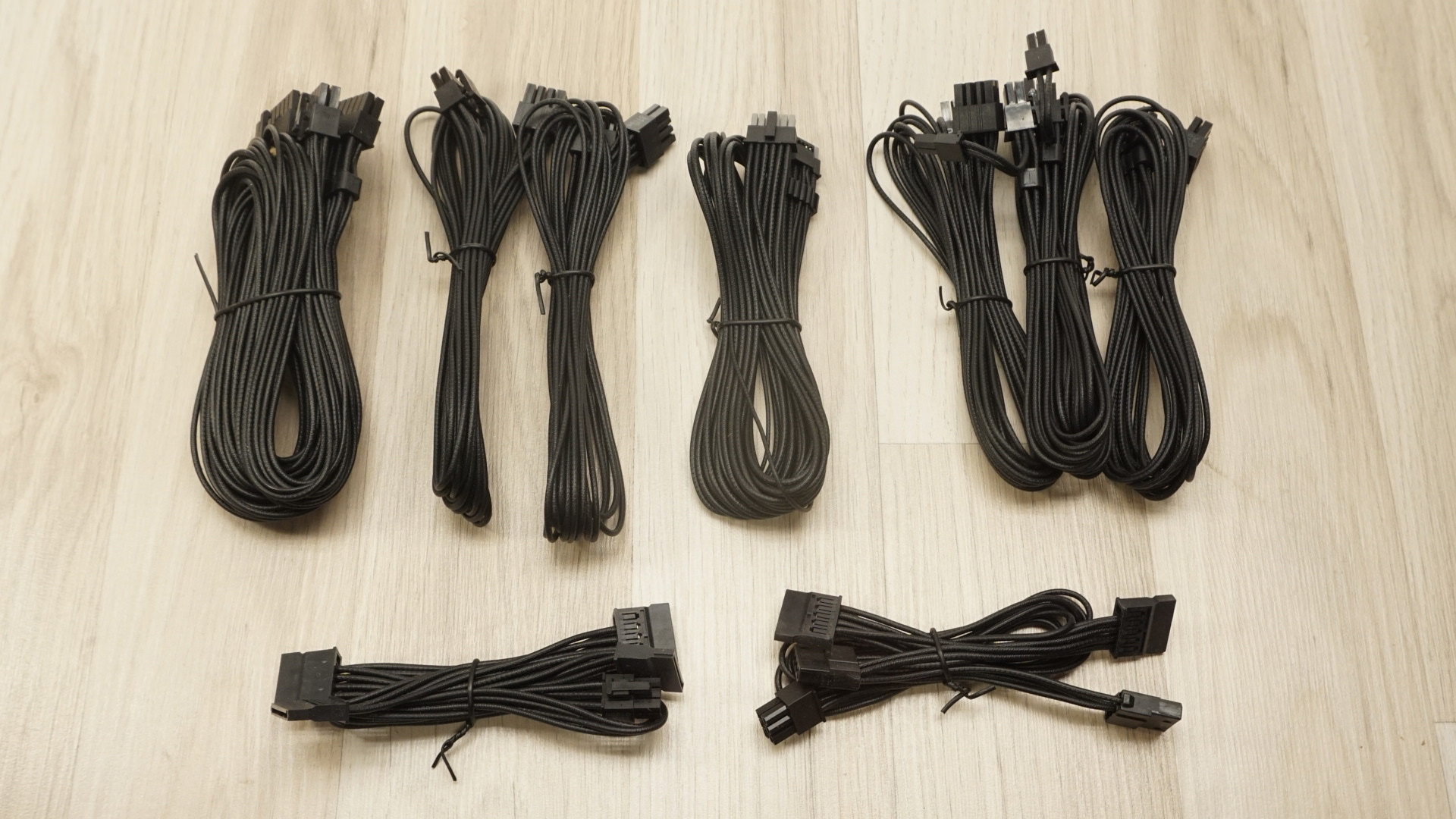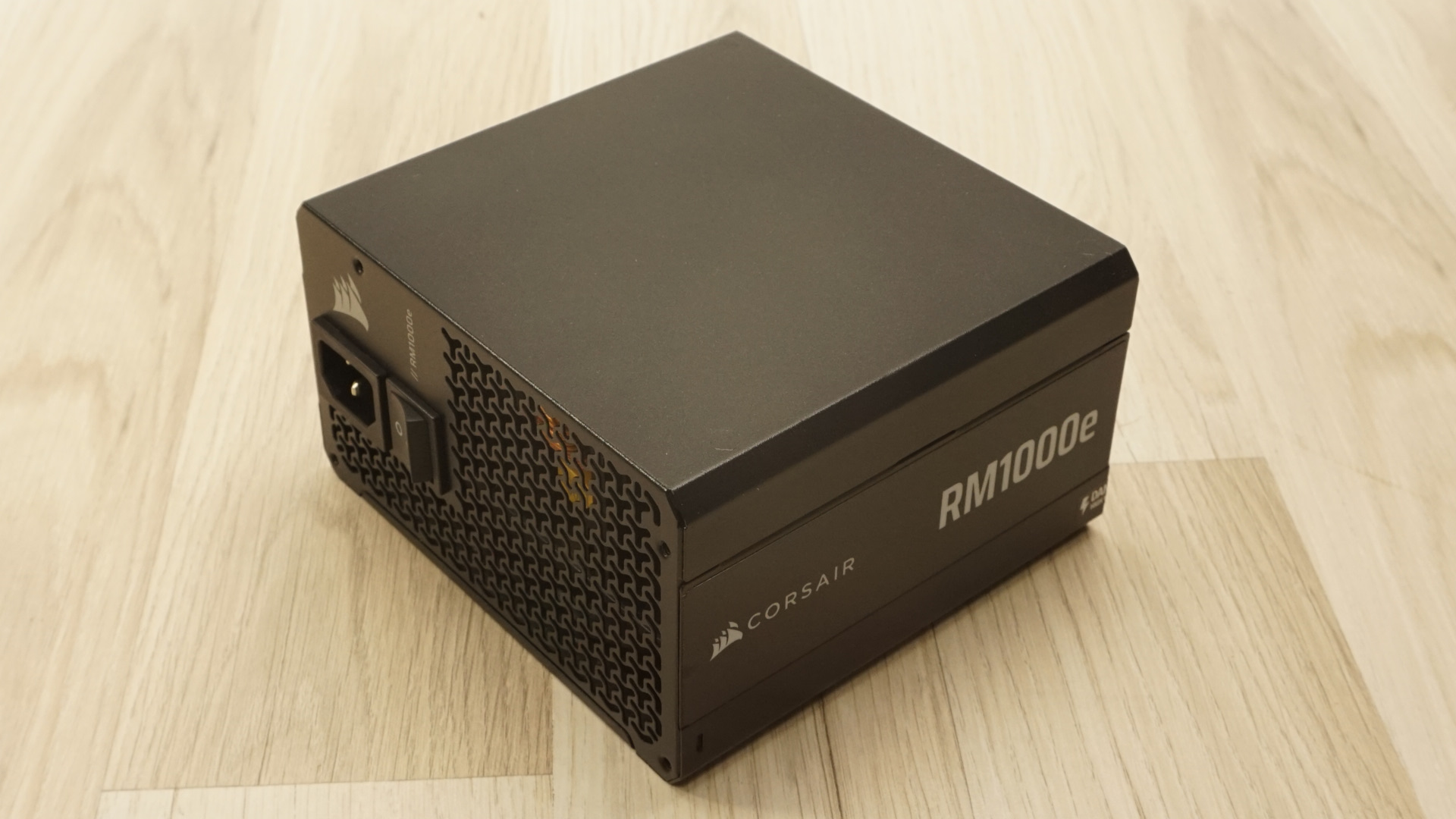Tom's Hardware Verdict
The Corsair RM1000e stands out for its tight voltage regulation, excellent ripple suppression, and stable thermal management. Although its reliance on second-tier components and a minimal accessory bundle raises concerns, the 7-year warranty mitigates these issues. However, at $170, it faces severe competition, even by Corsair’s own better products.
Pros
- +
ATX 3.1 / PCIe 5.1 compliant
- +
Compact
- +
Stands out aesthetically
- +
7-year warranty
- +
Reputable OEM
- +
Outstanding electrical performance
- +
Quiet under typical conditions
- +
Flexible cable design
- +
Great efficiency for its class
Cons
- -
Relatively expensive
- -
Mid-tier components
- -
Some signs of thermal stress
- -
Limited connectors
Why you can trust Tom's Hardware
Corsair, established in 1994, is a prominent American manufacturer that is today renowned for developing high-performance PC hardware components and peripherals. The company offers a comprehensive range of products, including PC cases, power supply units (PSUs), memory modules, and cooling solutions, catering to both mainstream users and gaming enthusiasts. In the power supplies segment, Corsair's RMe series is positioned as a line balancing performance with value, targeting mid-range gamers and PC builders.
We look closely at the RM1000e, the most powerful version of the RMe series, to see if it can stand out among the best power supplies on our list. It is also the latest 2025 version that comes with ATX 3.1 compliance. Developed in collaboration with a highly established OEM, the RM1000e emphasizes clean aesthetics, good quality, and good overall performance. This verifies Corsair’s strategy for the RMe series: to balance affordability and performance while ensuring compatibility with the latest industry standards, thus appealing to gamers and enthusiasts building future-proof PCs.
Specifications and Design
RAIL | +3.3V | +5V | +12V | +5Vsb | -12V |
MAX OUTPUT | 20A | 20A | 83.3A | 3A | 0A |
| Row 2 - Cell 0 | 150W | Row 2 - Cell 2 | 1000W | 15W | 0W |
TOTAL | 1000W | Row 3 - Cell 2 | Row 3 - Cell 3 | Row 3 - Cell 4 | Row 3 - Cell 5 |
AC INPUT | 100 - 240 VAC, 50 - 60 Hz | Row 4 - Cell 2 | Row 4 - Cell 3 | Row 4 - Cell 4 | Row 4 - Cell 5 |
PRICE | $170 | Row 5 - Cell 2 | Row 5 - Cell 3 | Row 5 - Cell 4 | Row 5 - Cell 5 |
In the Box
The Corsair RM1000e arrives in a sturdy cardboard box featuring Corsair’s signature yellow and black theme. The power supply is securely packaged inside a nylon pouch and protected by packaging paper inserts, minimizing plastic usage in line with Corsair’s environmentally conscious approach.
Corsair includes a standard bundle of accessories, featuring mounting screws, an AC power cable, and a few black cable ties. The bundle is minimalistic and provides just the essential parts for installation and basic cable management.
The RM1000e comes with all-black, individually sleeved cables featuring black connectors. The cables are soft and flexible, making routing and organization easier. Pre-installed cable combs on the ATX and PCIe cables help maintain a structured and clean appearance. The power supply is equipped with a conservative number of connectors for a 1000W unit.
Connector type | Hardwired | Modular |
|---|---|---|
ATX 24 Pin | - | 1 |
EPS 4+4 Pin | - | 2 |
EPS 8 Pin | - | - |
PCI-E 5.0 | - | 1 |
PCI-E 8 Pin | - | 3 |
SATA | - | 8 |
Molex | - | 3 |
Floppy | - | - |
External Appearance
The Corsair RM1000e measures just 140 mm long, making it notably compact for a 1000W ATX PSU. Its small footprint ensures compatibility with virtually all ATX-compliant cases, making it an excellent choice for a wide range of system builds. The power supply features a satin black chassis with subtle chamfered edges for a refined appearance. A decorative Corsair logo sticker is placed on the left side, while the right side houses a label with the unit’s electrical specifications and certifications.
The cooling fan is protected by an integrated metal grille, which is part of the chassis itself and features a unique design pattern. A similar but denser pattern is applied to the ventilation openings on the rear panel. The top panel remains entirely clean.
Get Tom's Hardware's best news and in-depth reviews, straight to your inbox.
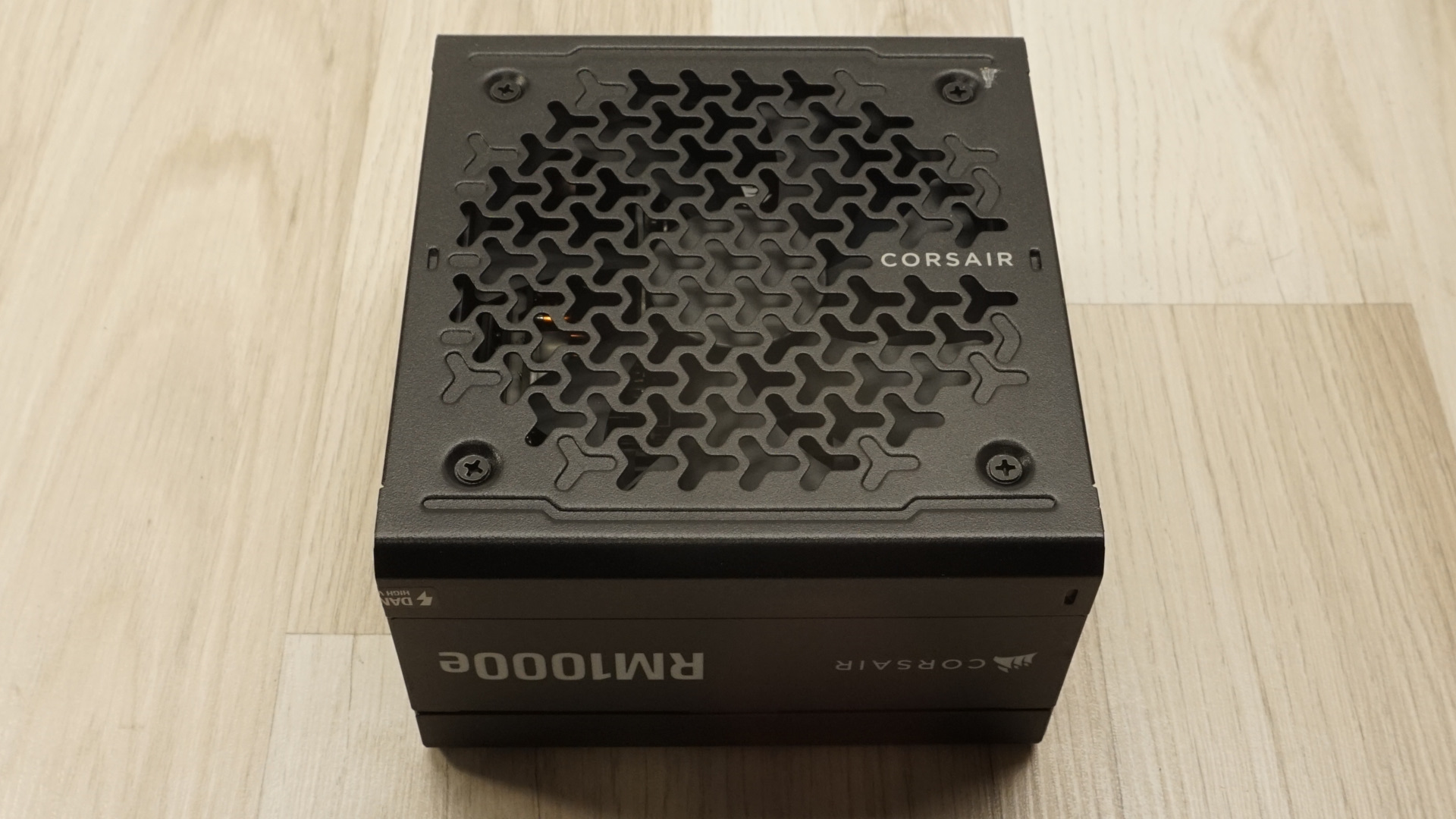
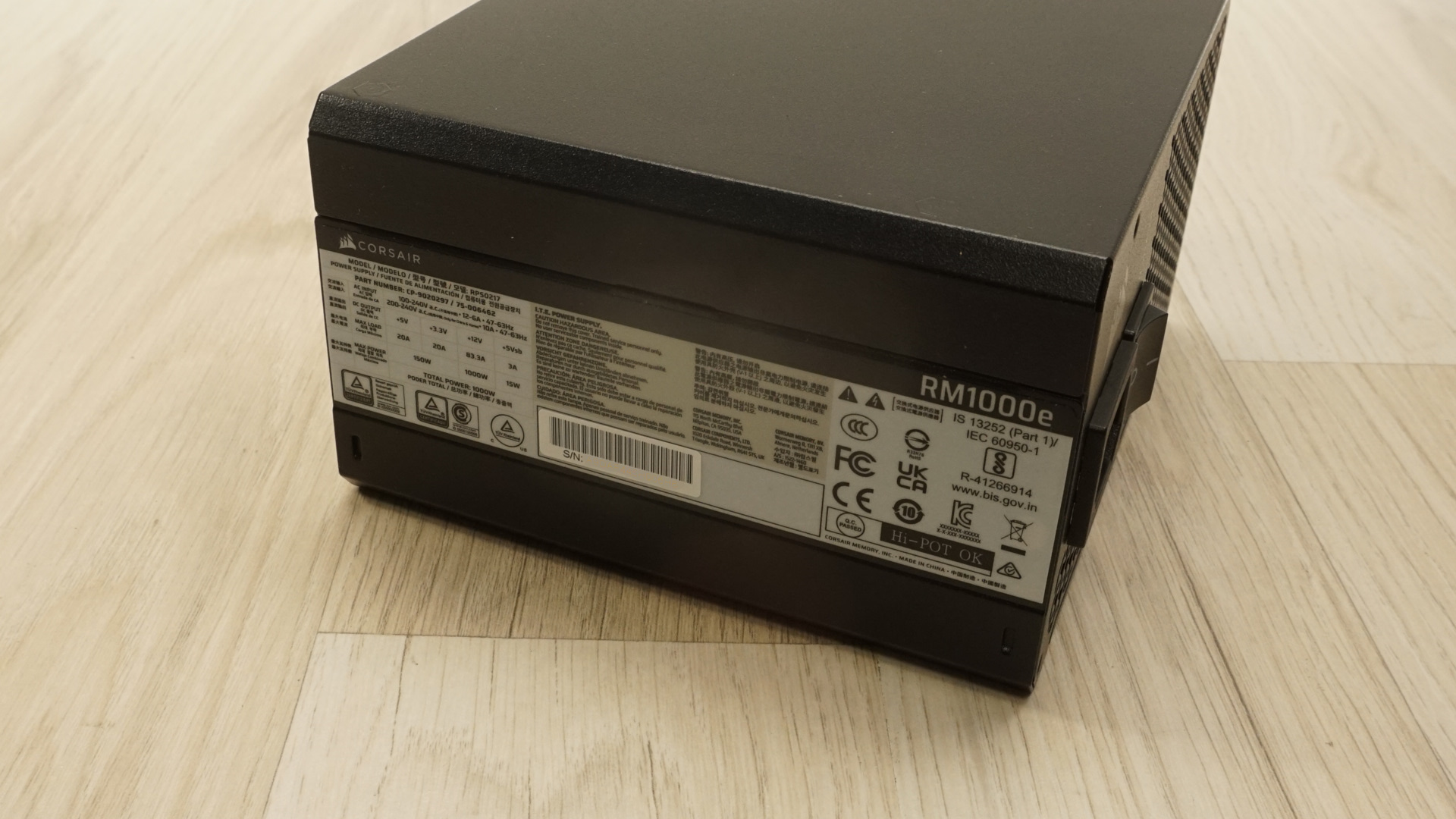
The rear panel includes the standard AC input socket and an oversized power switch. Unlike some higher-end models, the RM1000e does not include a dedicated button for hybrid fan mode, but it does feature Zero RPM Fan Mode, which automatically keeps the fan off under low to moderate loads. The front panel houses the modular cable connectors, with a subtle legend surrounding them.
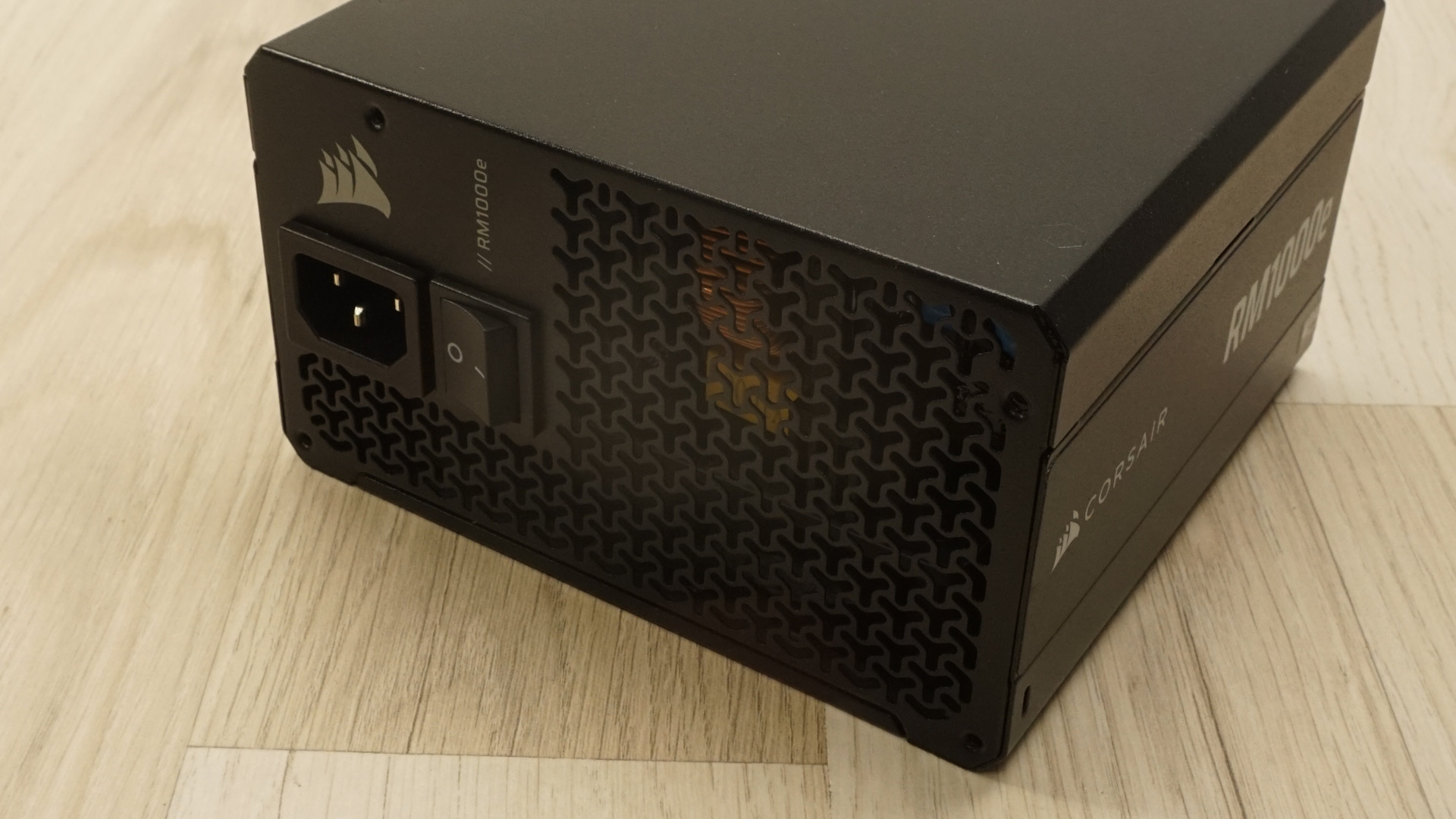
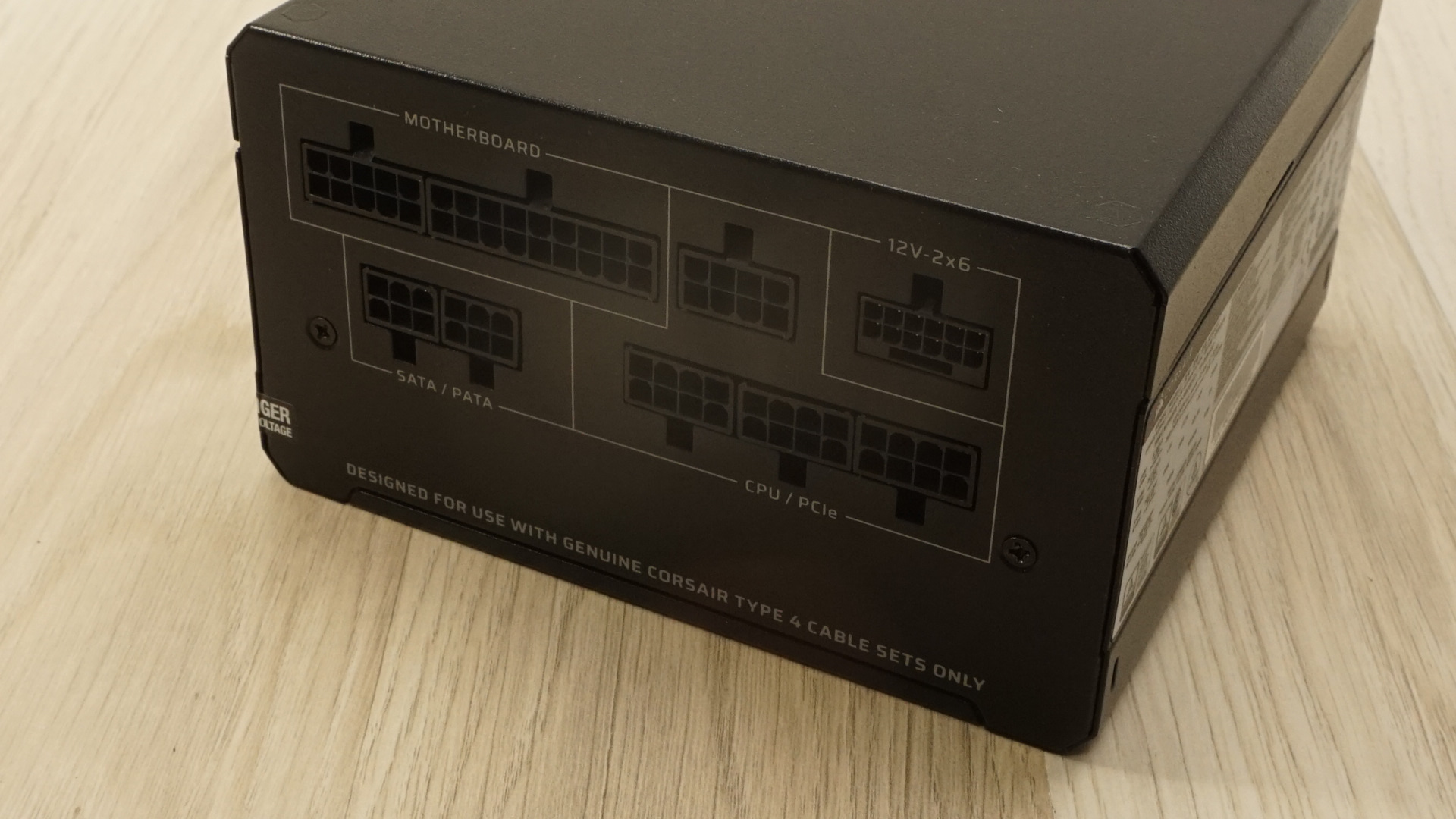
Internal Design
The Corsair RM1000e features a 120 mm Hong Hua HA1225H12SF-Z fan, which utilizes a rifle-bearing engine - an improved version of sleeve bearings that offers quieter operation and moderate longevity. This fan has a maximum speed of 2200 RPM, but thanks to the Zero RPM Fan Mode, it remains inactive under low to moderate loads.
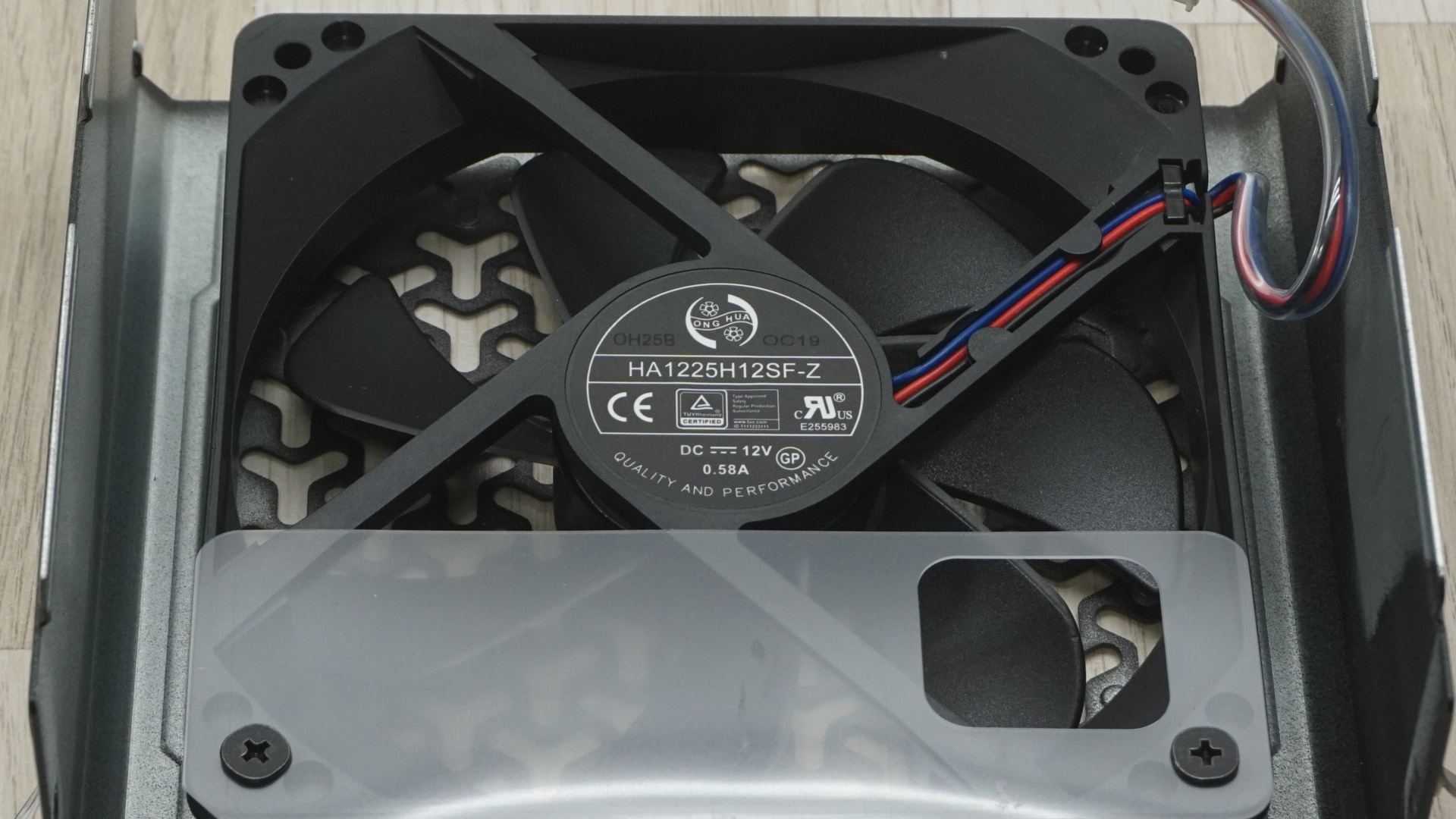
HEC (Compucase) serves as the OEM for the RM1000e. HEC is one of the oldest and most reputable OEMs on the planet, with their products frequently found behind low-to-mid range units.
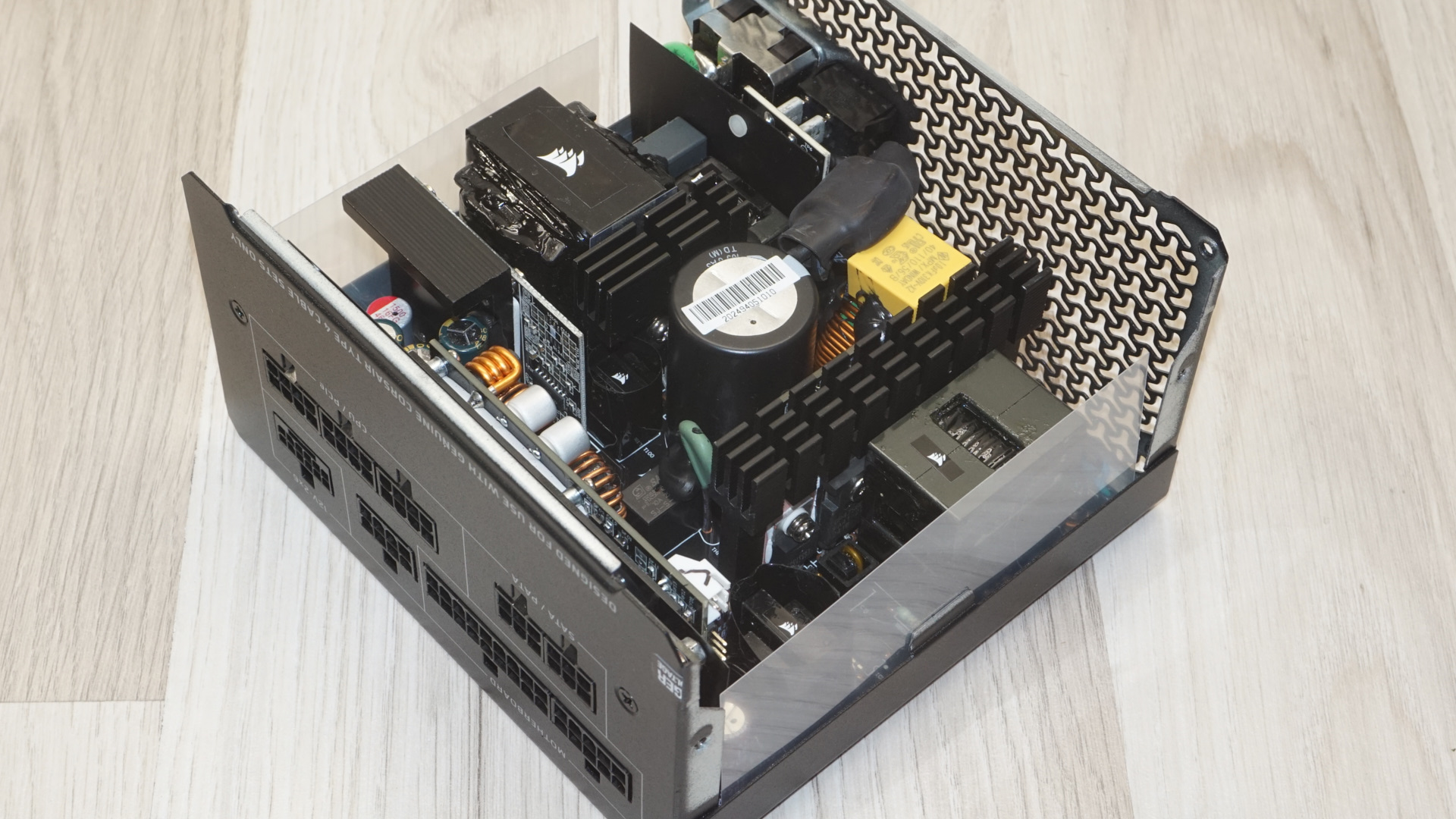
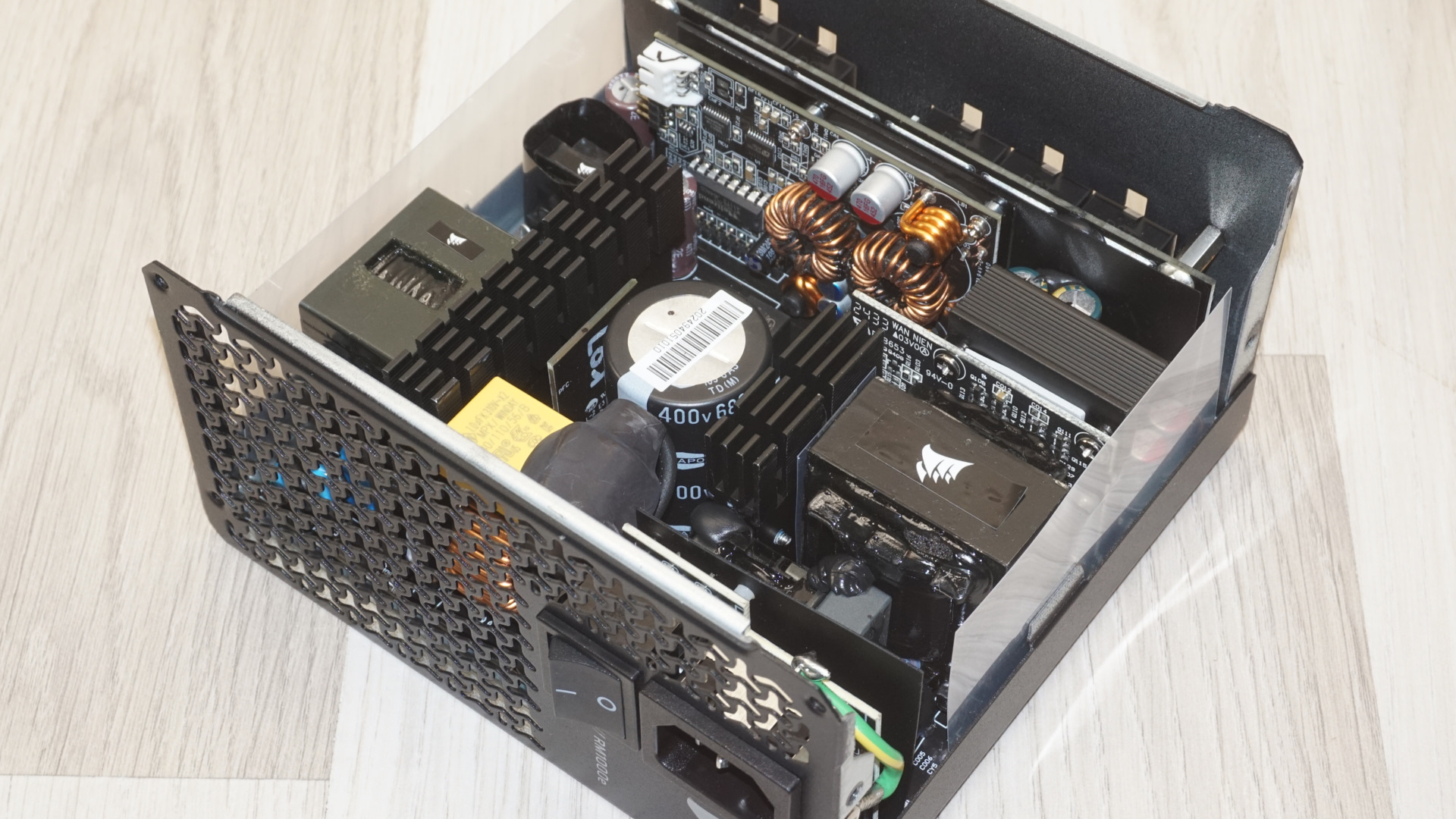
The input filtering stage is robust, featuring four Y capacitors, three X capacitors, and two filtering inductors. Two rectifying bridges are mounted on the largest heatsink, directly following the filtering stage. The Active Power Factor Correction (APFC) stage consists of two GP47S60 MOSFETs and a single diode, all sharing the same heatsink as the rectifiers. The passive components of the APFC stage include one large encased inductor and a Teapo 680 µF capacitor.
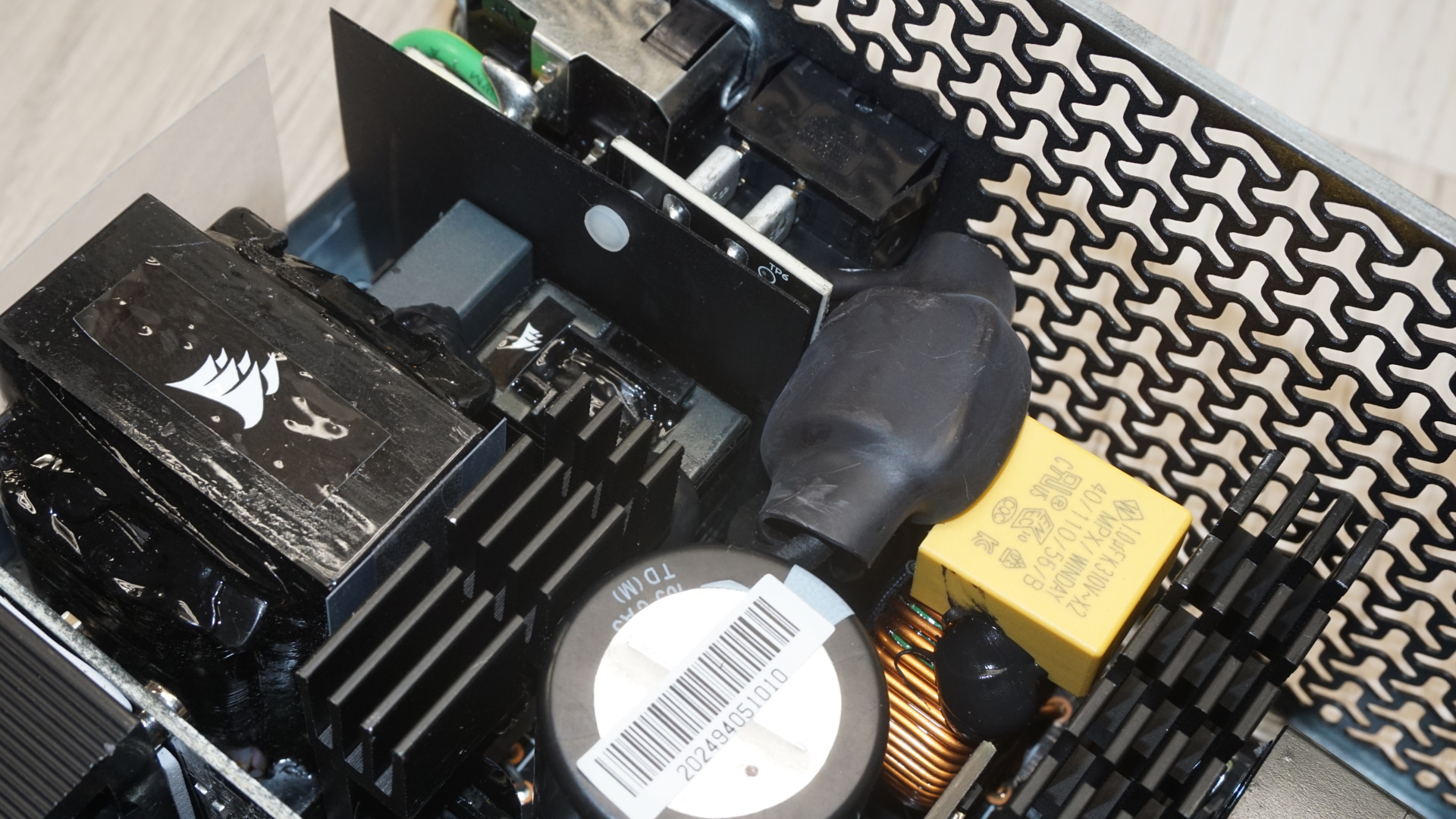
The primary conversion stage follows a half-bridge LLC topology, with two MOSFETs by Great Power mounted on a heatsink adjacent to the main transformer. On the secondary side, four MOSFETs generate the primary 12V rail, cooled by a smaller heatsink. The 3.3V and 5V rails are derived from DC-to-DC converters mounted on a vertical daughterboard, a standard approach for modern, high-efficiency power supplies.
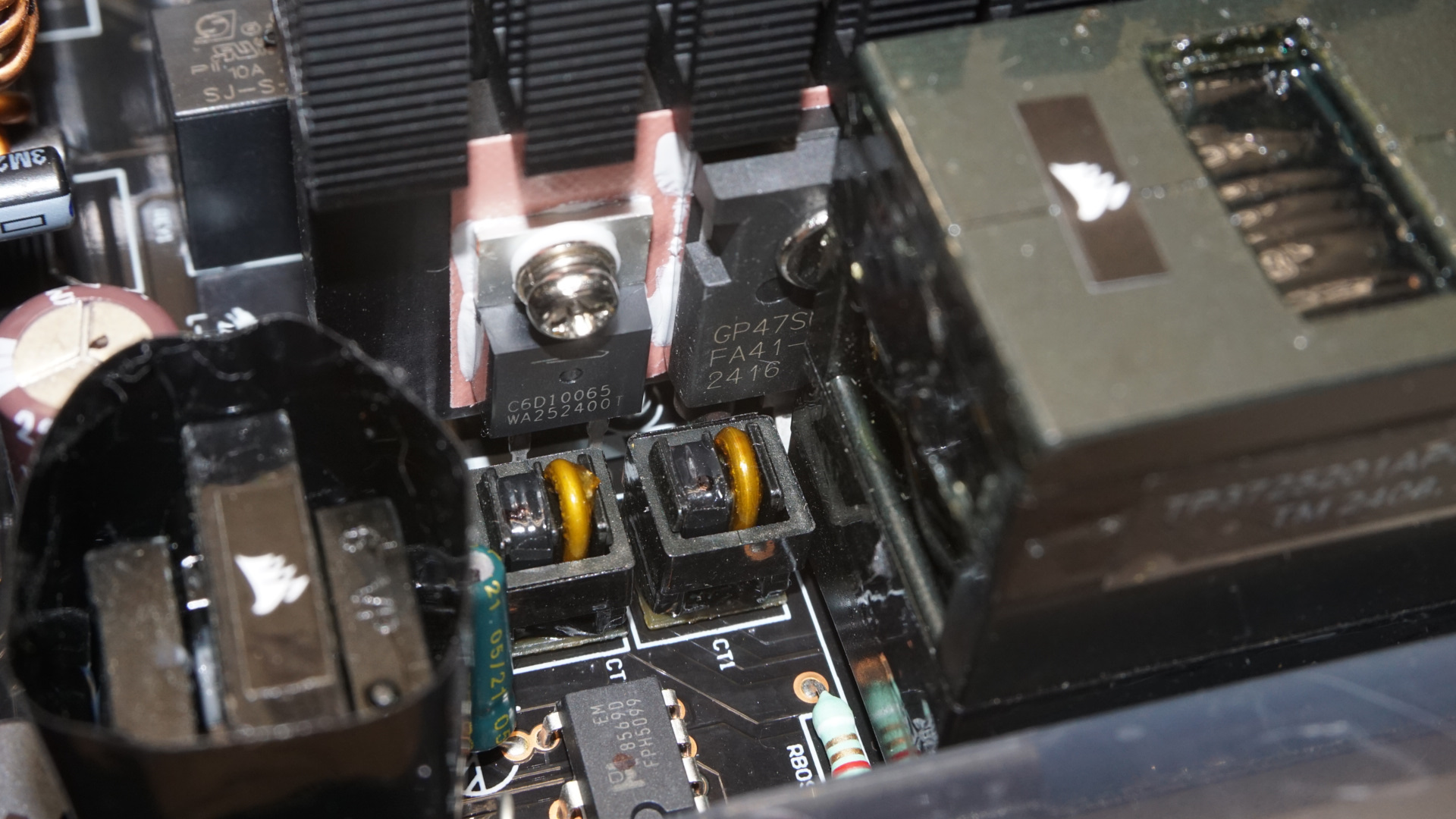
The secondary-side capacitors consist mainly of Teapo electrolytic and polymer capacitors, with a few Nippon Chemi-Con polymer capacitors found on the DC-DC daughterboards. While Teapo components are considered mid-tier, they are widely used in cost-conscious PSU designs.
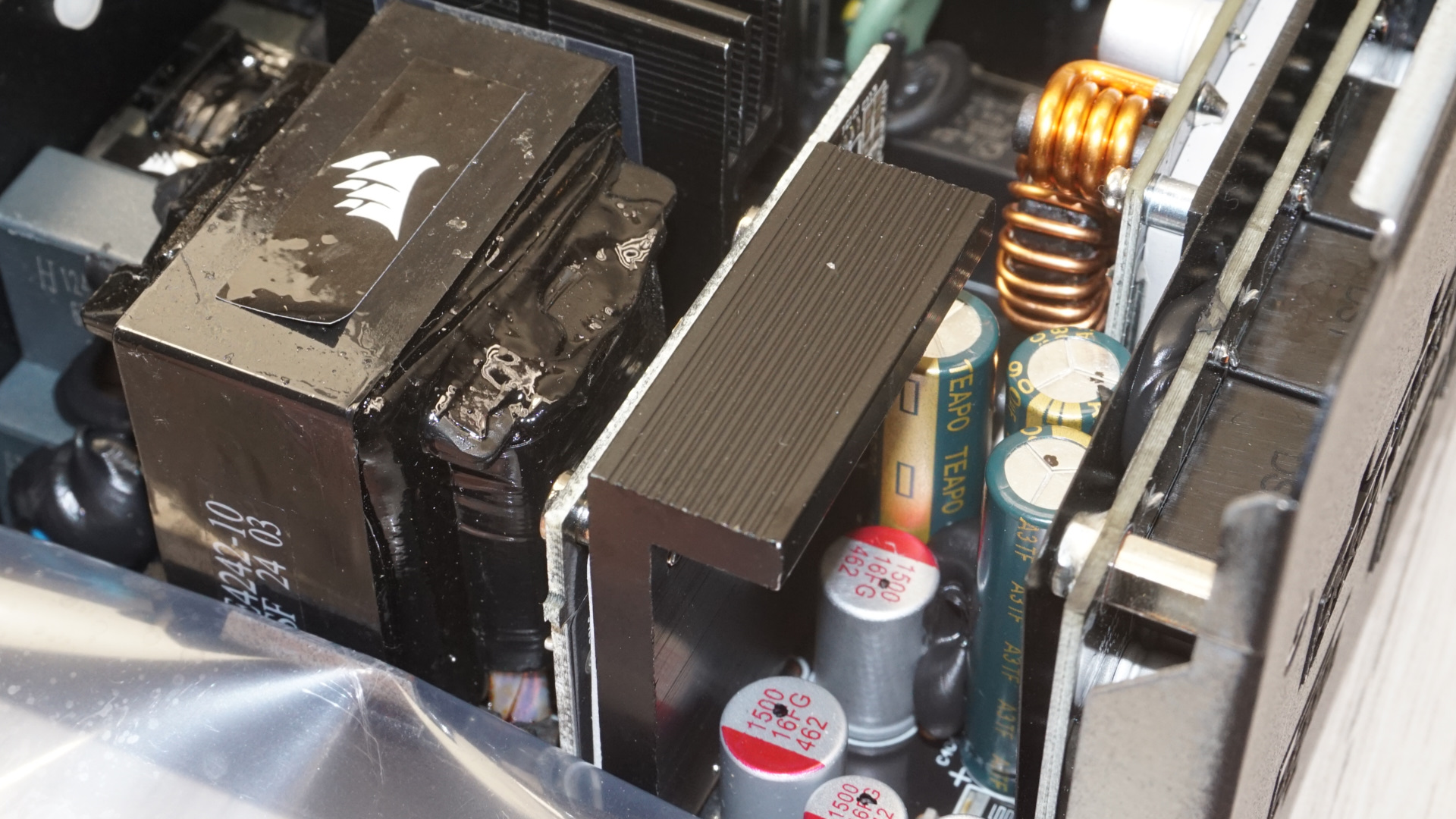
Cold Test Results
Cold Test Results (25°C Ambient)
For power supply testing, we are using high-precision electronic loads with a maximum power draw of 2700 Watts, a Rigol DS5042M 40 MHz oscilloscope, an Extech 380803 power analyzer, two high-precision UNI-T UT-325 digital thermometers, an Extech HD600 SPL meter, a self-designed hotbox, and various other bits and parts.
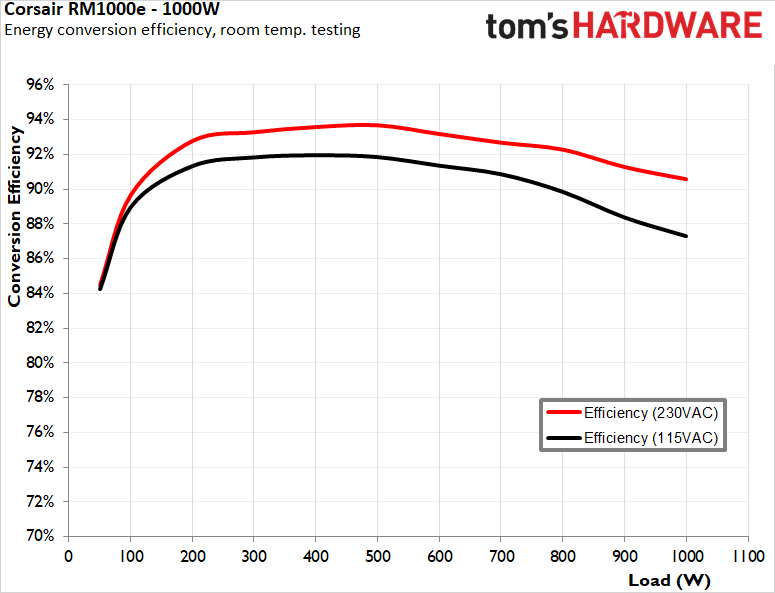
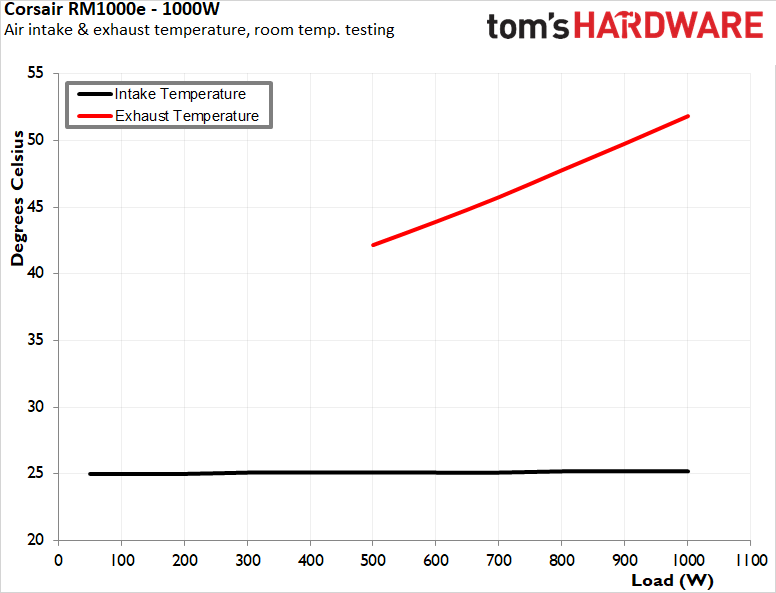
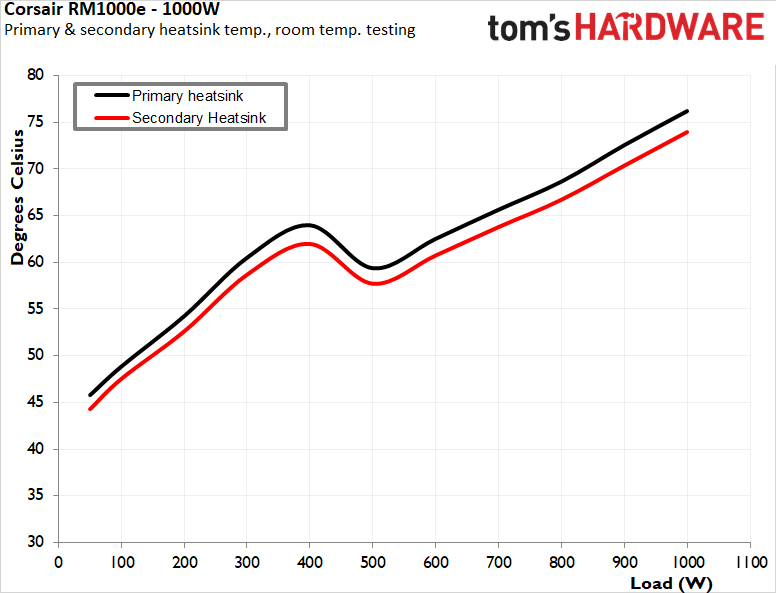
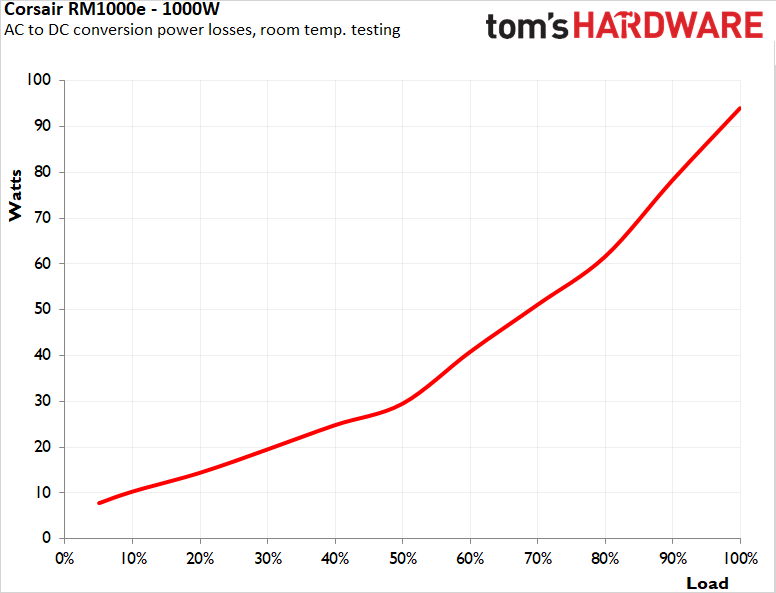
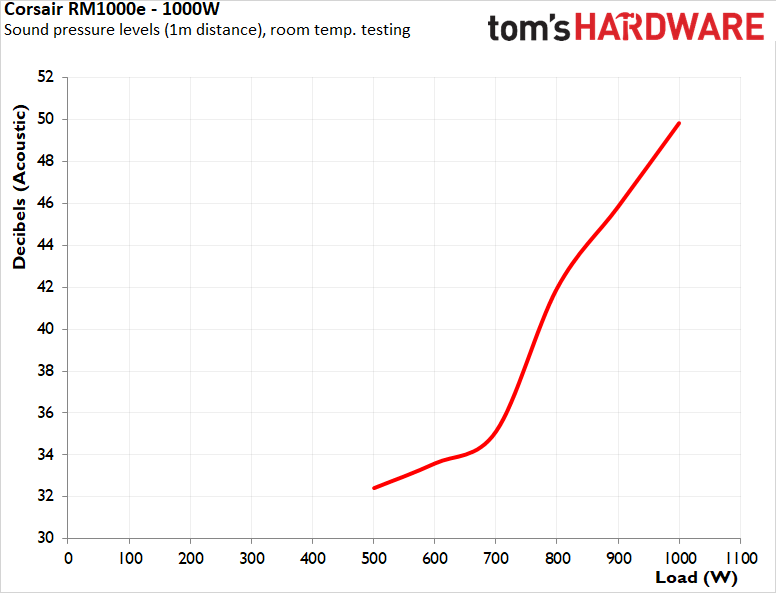
During cold testing, the Corsair RM1000e exhibited an average nominal load efficiency of 90.4% at 115 VAC and 92.3% at 230 VAC, meeting the CLEAResult 80Plus Gold certification requirements. However, it falls short of the CLEAResult Platinum certification due to missing the 94% efficiency requirement at 50% load. Cybenetics, on the other hand, whose specification mostly depends on average efficiency, gave this unit a Platinum certification. The PSU does deliver good efficiency across its entire operating range, including very low loads.
The 120mm fan remained off until the load approached 500W, allowing for completely silent operation under light to moderate loads. Once activated, the fan started at a very low speed at first, but its speed sharply increases at higher loads. The PSU remained relatively quiet up to 700W, but beyond this threshold, fan speed increased sharply to manage rising temperatures. The thermal performance of the unit is good, maintaining relatively low temperatures under normal conditions.
Hot Test Results
Hot Test Results (~45°C Ambient)
During hot testing, the Corsair RM1000e exhibited an average nominal load efficiency of 89.3% at 115 VAC and 91.2% at 230 VAC—a decrease of approximately 1.1% compared to the cold test results of 90.4% and 92.3%, respectively. This slight reduction in efficiency under elevated ambient temperatures generally is expected, but the more pronounced drop is observed under very high loads suggests thermal stress on the active components.
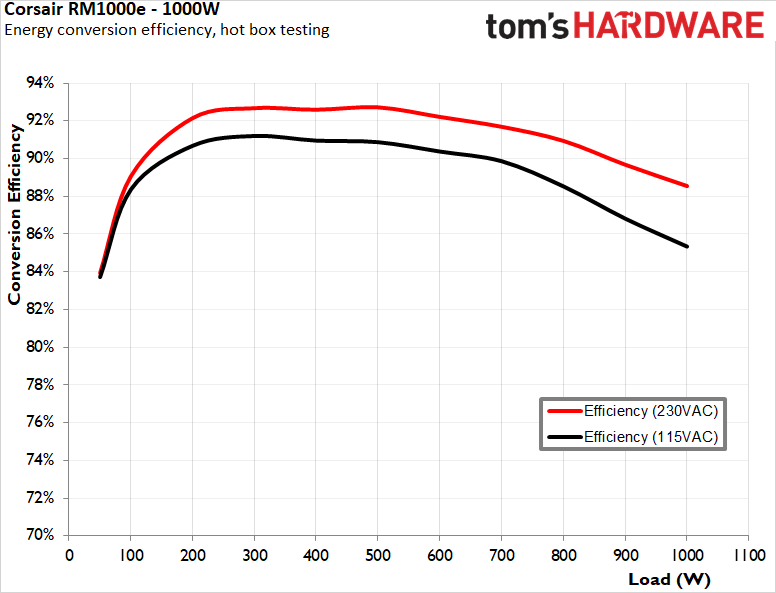
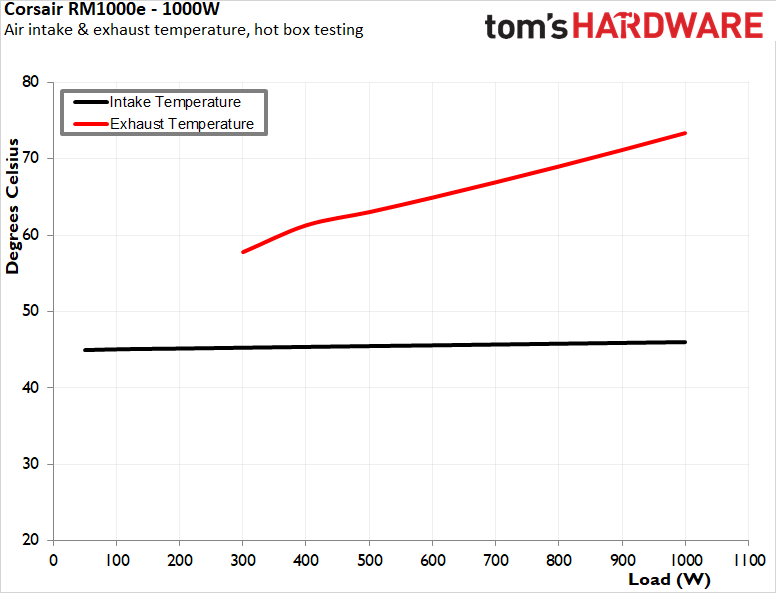
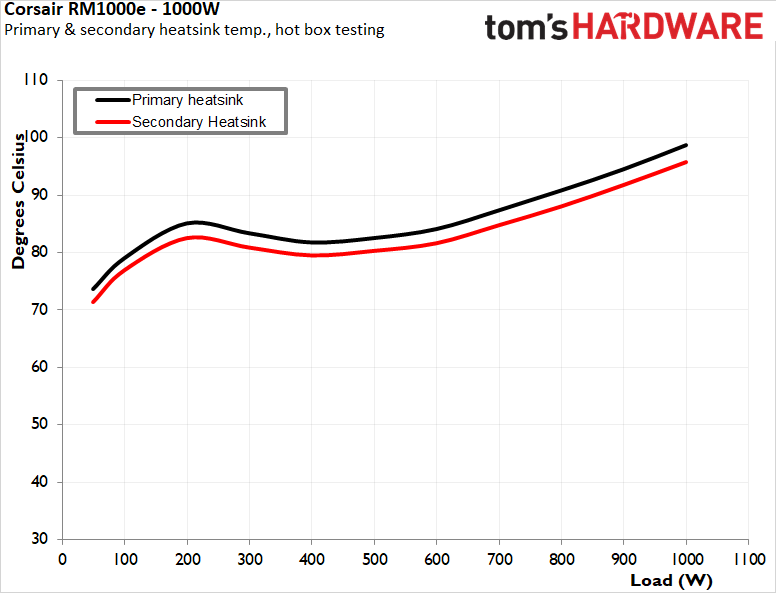
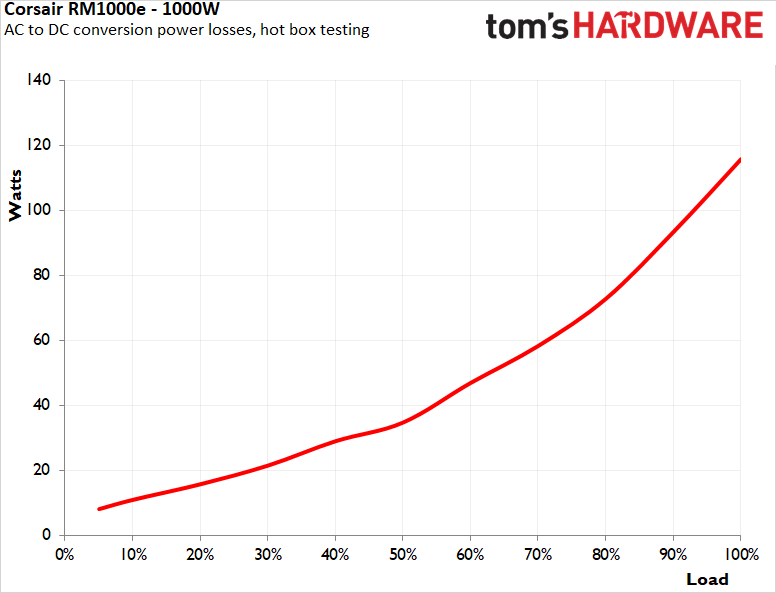
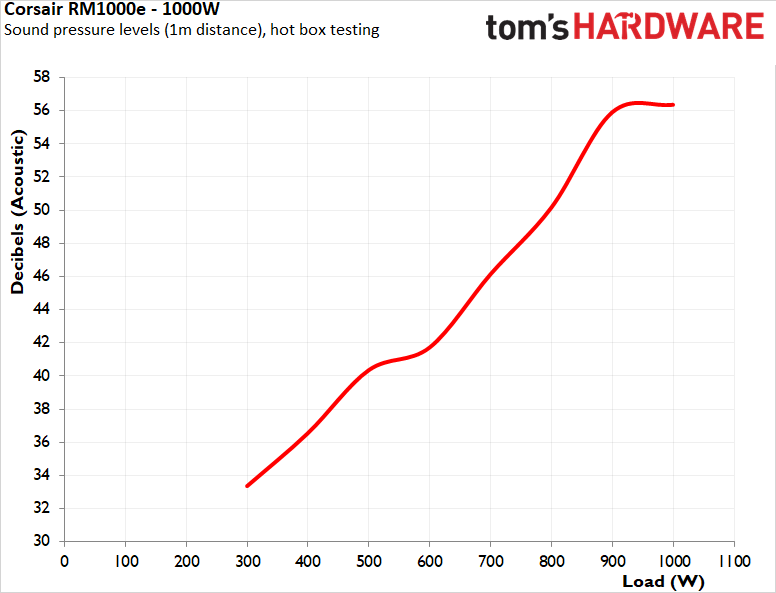
The cooling system responds as expected under hot conditions. The fan initiates operation at a load just above 250W - much sooner than during cold testing - with the fan speed rising linearly and reaching its maximum speed when the load slightly exceeds 900W. The power supply strives to maintain a well-balanced performance between cooling efficiency and acoustic output, but noise levels undoubtedly increase greatly in adverse conditions and under heavy loads.
PSU Quality and Bottom Line
Power Supply Quality
The Corsair RM1000e power supply delivered outstanding electrical performance in voltage regulation and ripple suppression. Voltage regulation was exceptionally tight, with deviations of only 0.9% on the 12V rail and 0.7% on the 5V and 3.3V rails, ensuring stable power delivery under varying loads. Ripple filtering was similarly impressive, with maximum ripple levels of 36 mV on the 12V rail, 18 mV on the 5V rail, and 16 mV on the 3.3V rail, indicating superior power quality for its class.
During our thorough assessment, we evaluate the essential protection features of every power supply unit we review, including Over Current Protection (OCP), Over Voltage Protection (OVP), Over Power Protection (OPP), and Short Circuit Protection (SCP). All protection mechanisms were activated and functioned correctly during testing.
The OCP thresholds were set at 140% for the 3.3V rail, 144% for the 5V rail, and 130% for the 12V rail, while the Over Power Protection (OPP) triggered at 132% under hot conditions. These protection levels are a bit high, but not unexpectedly so for an ATX 3.1 unit.
Load (Watts) | 201.49W | Row 0 - Cell 2 | 502.8W | Row 0 - Cell 4 | 751.17W | Row 0 - Cell 6 | 998.22W | Row 0 - Cell 8 |
Load (Percent) | 20.15% | Row 1 - Cell 2 | 50.28% | Row 1 - Cell 4 | 75.12% | Row 1 - Cell 6 | 99.82% | Row 1 - Cell 8 |
Amperes | Volts | Amperes | Volts | Amperes | Volts | Amperes | Volts | |
3.3 V | 1.85 | 3.39 | 4.62 | 3.39 | 6.93 | 3.37 | 9.24 | 3.36 |
5 V | 1.85 | 5.03 | 4.62 | 5.02 | 6.93 | 5.05 | 9.24 | 5 |
12 V | 15.39 | 12.08 | 38.47 | 12.06 | 57.71 | 12.01 | 76.94 | 11.97 |
| Row 6 - Cell 0 | Row 6 - Cell 1 | Row 6 - Cell 2 | Row 6 - Cell 3 | Row 6 - Cell 4 | Row 6 - Cell 5 | Row 6 - Cell 6 | Row 6 - Cell 7 | Row 6 - Cell 8 |
Line | Regulation (20% to 100% load) | Voltage Ripple (mV) | Row 0 - Cell 3 | Row 0 - Cell 4 | Row 0 - Cell 5 | Row 0 - Cell 6 | Row 0 - Cell 7 |
| Row 1 - Cell 0 | Row 1 - Cell 1 | 20% Load | 50% Load | 75% Load | 100% Load | CL1 12V | CL2 3.3V + 5V |
3.3V | 0.7% | 8 | 12 | 14 | 16 | 16 | 16 |
5V | 0.7% | 12 | 16 | 16 | 18 | 18 | 16 |
12V | 0.9% | 16 | 14 | 26 | 36 | 36 | 16 |
Bottom Line
The Corsair RM1000e represents the most powerful of Corsair’s RMe series, designed to deliver robust performance in a compact form factor. Housed in a 140 mm long chassis, the unit exudes a refined aesthetic with its satin black finish and integrated design features. Despite its minimalistic accessory bundle and conservative connector count, the RM1000e delivers all the essential functionalities expected from a good ATX 3.1 power supply. However, the primary compromise lies in the choice of components, which are sourced from second-tier manufacturers, a decision that is somewhat mitigated by its comprehensive 7-year warranty.
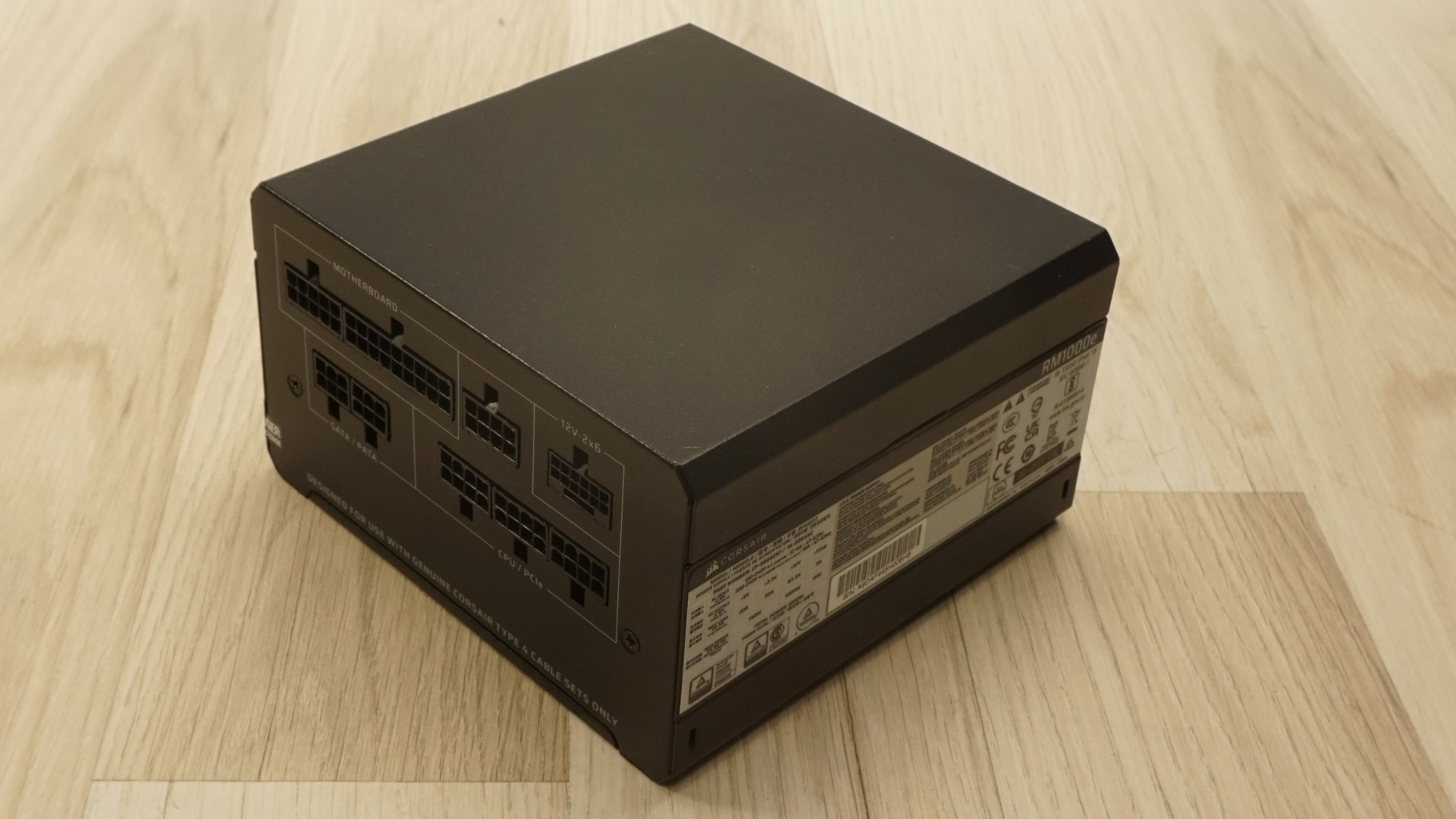
Electrically, the RM1000e demonstrates impressive performance characteristics, delivering outstanding voltage regulation and ripple suppression. During testing, it achieved an average nominal load efficiency of 90.4% at 115 VAC and 92.3% at 230 VAC, which are high figures for a Gold-level unit. Cybenetics, whose testing depends mostly on average efficiency, graced this unit with a Platinum certification. Considering the component suppliers and the thermal stressing, the overall electrical performance of the RM1000e is surprisingly good.
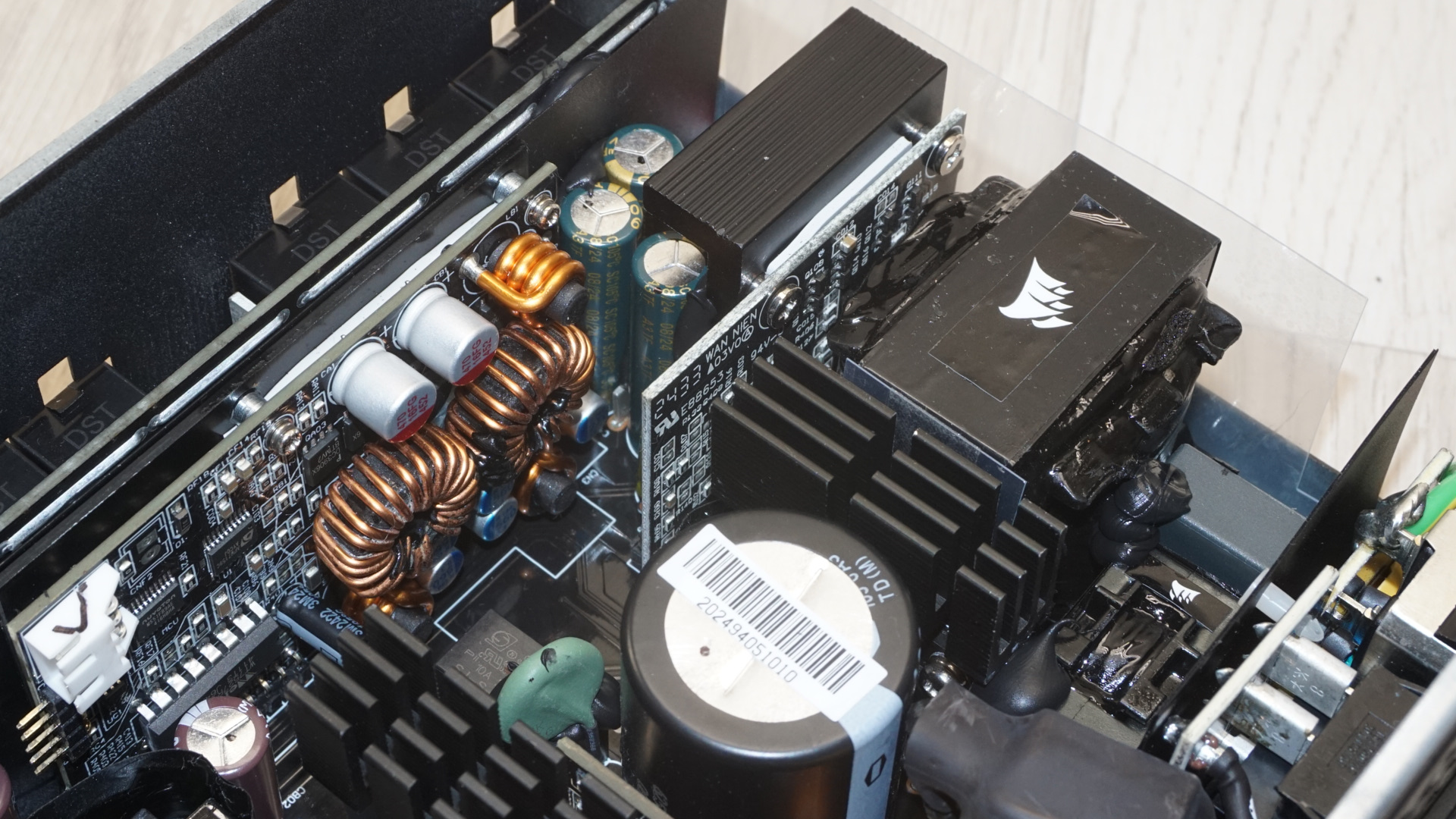
Thermally, the RM1000e maintains a delicate balance between cooling efficiency and noise management. Under low to moderate loads, its zero RPM mode keeps the fan inactive, providing virtually silent operation. As the load increases, the fan engages - initially at a gentle pace until reaching approximately 700W, then ramping up sharply beyond 700W to manage rising temperatures. In hotter ambient conditions, the unit demonstrates a modest efficiency drop and a more aggressive fan response, indicative of a well-calibrated adaptive thermal management. While noise levels remain acceptable during typical usage, they become more pronounced under heavy load, which is a drawback for users expecting to stress their units a lot.
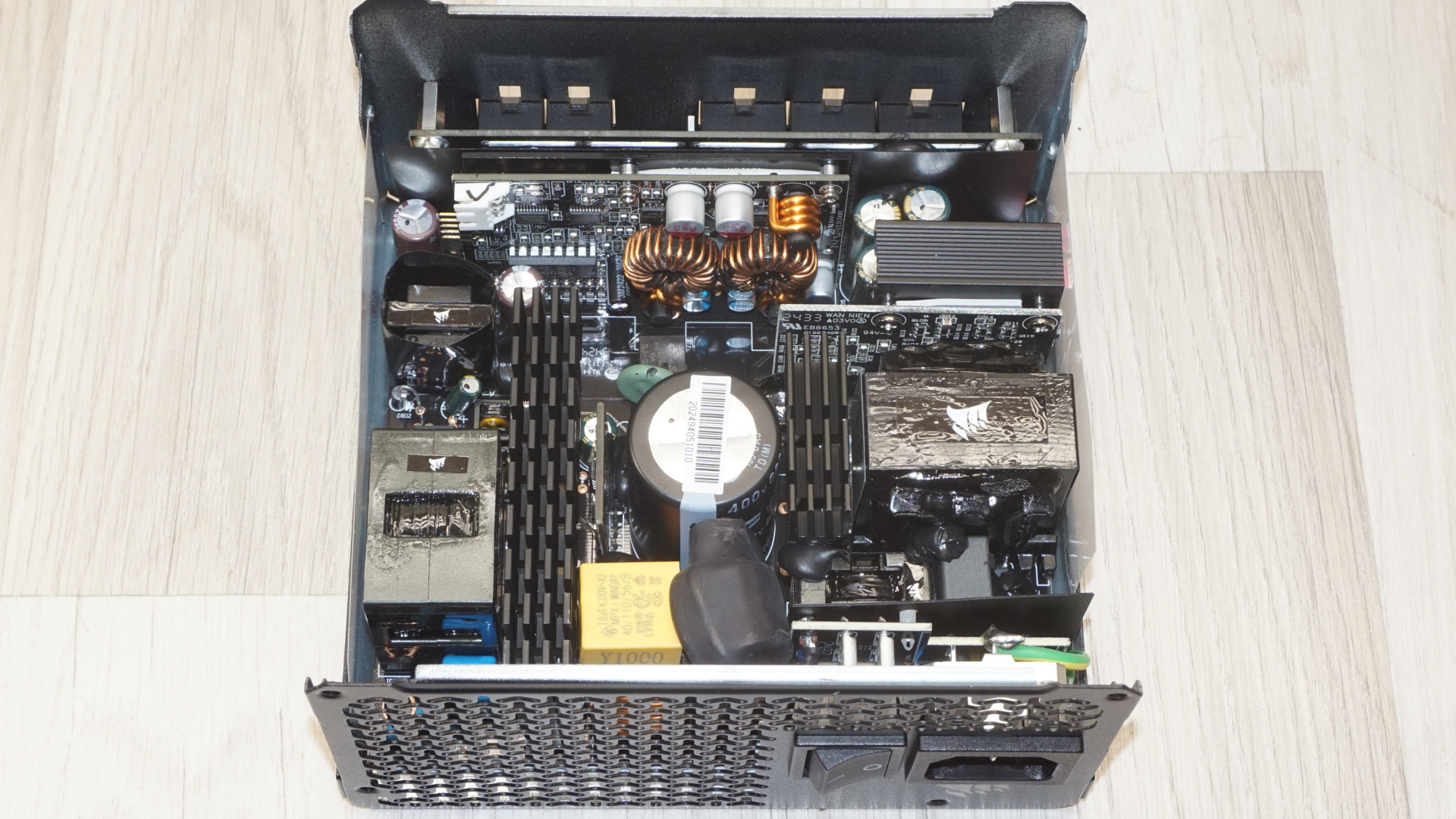
In summary, the Corsair RM1000e stands out for its excellent electrical performance and aesthetics, making it a viable contender in its class. Although the use of second-tier components is a point of criticism, it is partially mitigated by the generous 7-year warranty and the unit’s reliable overall performance. However, currently priced at $170 at the time of this review, the RM1000e is positioned at the upper end of its segment and dangerously close in price to the significantly superior RM1000x, raising questions about its value proposition.
MORE: Best Power Supplies
MORE: How We Test Power Supplies
MORE: All Power Supply Content

Dr. E. Fylladitakis has been passionate about PCs since the 8088 era, beginning his PC gaming journey with classics like Metal Mutant and Battle Chess. Not long after, he built his first PC, a 486, and has been an enthusiast ever since. In the early 2000’s, he delved deeply into overclocking Duron and Pentium 4 processors, liquid cooling, and phase-change cooling technologies. While he has an extensive and broad engineering education, Dr. Fylladitakis specializes in electrical and energy engineering, with numerous articles published in scientific journals, some contributing to novel cooling technologies and power electronics. He has been a hardware reviewer at AnandTech for nearly a decade. Outside of his professional pursuits, he enjoys immersing himself in a good philosophy book and unwinding through PC games.
-
Mindstab Thrull Why is that table labeled "- need to be updated" ???Reply
If you're going to submit an article, please make sure basic stuff like this is fixed! -
LucianoSmurf I must be old, 1,000 watts and almost 200 bucks after tax it's only mid-range these days. Good to know I guess, it just expedites my exodus of PC gaming. My wallet Just can't keep up.Reply
